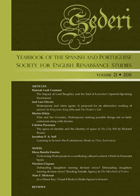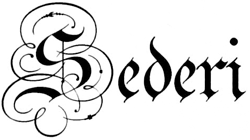
Sederi 21
Sederi 21 — 2011
EDITORS
Berta Cano Echevarría & Ana Sáez-Hidalgo
REVIEW EDITOR
Francisco J. Borge López
ISSN 1135-7789
Cristina Paravano, “The Space of Identity and the Identity of Space in The City Wit by Richard Brome.” SEDERI 21 (2011): 71-90.
DOI: https://doi.org/10.34136/sederi.2011.4 Download PDF
Abstract
My paper examines The City Wit (1629-1632), a city comedy by Richard Brome revolving around the unscrupulous trade world, where all the characters aim at social recognition, even trampling on feelings and moral values. My objective is to investigate the play as one of the earlier examples of strategic use of space in Brome’s dramatic production. Firstly, I will consider the function of space in relation to the identity of the single characters. Secondly, I will show how space can be manipulated for the re-fashioning of a new identity, as in the case of Jeremy, a male servant disguised as a widow, who builds up a fictitious Cornish identity. Finally, I will analyze the geography of the play focusing in particular on the scene set in the Presence Chamber of Whitehall.
Keywords: Space; identity; fashioning; geography; gender.
References
Ackroyd, Peter 2009. London: The Biography. London: Chatto and Windus.
Andrews, Clarence E. 1972 (1913). Richard Brome: A Study of His Life and Works. New York: Archon.
Astington, John 1999. English Court Theatre: 1558-1647. Cambridge: Cambridge University Press.
Brome, Richard 2004 (1629-1632). The City Wit. Ed. Katherine Wilkinson. <url: http://extra.shu.ac.uk/emls/iemls/renplays/citywit.htm>. Last accessed 20/10/2010.
Brome, Richard 2010 (1629-1632). The City Wit, Modern Text. Ed. Elizabeth Schafer. Richard Brome Online . <url: http://www.hrionline.ac.uk/brome ISBN 978-0-9557876-1-4>. Last accessed 20/10/2010
Butler, Martin 1984. Theatre and Crisis, 1632-1642. Cambridge: Cambridge University Press.
Chandler, W. K. 1929. “The Topography of Dekker’s The Shoemaker’s Holiday.” Studies in Philology 26/4: 499-504.
Cave, Richard Allen 2003. “The Playwriting Sons of Ben: Nathan Field and Richard Brome.” Ed. Brian Woolland. Jonsonians: Living Traditions. Aldershot: Ashgate. 69-91.
Cave, Richard Allen 2008. “Endings in Renaissance Comedy: Ben Jonson and Richard Brome.” Ed. Daniela Carpi. Practising Equity, Addressing Law: Equity in Law and Literature. Heidelberg: Winter. 263-283.
Clark, Ira 1992. Professional Playwrights. Massinger, Ford, Shirley, & Brome. Lexington: The University Press of Kentucky.
Cressy, David 1980. Literacy and the Social Order: Reading and Writing in Tudor and Stuart England. Cambridge: Cambridge University Press.
Dessen, Alan C., Thomson, Leslie 1999. A Dictionary of Stage Directions in English Drama, 1580-1642. Cambridge: Cambridge University Press.
Durban, Kim 2010. “Upside down at the bottom of the world: taking Richard Brome to the Antipodes.” Richard Brome Online. <url: http://www.hrionline.ac.uk/bromeISBN978-0-9557876-1-4>. Last accessed 20/10/2010.
Gibbons, Brian 1980. Jacobean City Comedy. London: Methuen.
Grantley, Darryl 2008. London in Early Modern Drama: Representing the Built Environment. Basingstoke and London: Palgrave.
Hibbert, Christopher 1969. London: The Biography of a City. London: Penguin Books.
Knight, G. Wilson 1967. Shakespeare and Religion: Essays of Forty Years. New York: Routledge.
Knights, Lionel C. 1951 (1937). Drama and Society in the Age of Jonson. London: Chatto and Windus.
Jonson, Ben. 1995 (1616). The Alchemist and Other Plays. Ed. Gordon Campbell. Oxford: Oxford University Press.
Leggatt, Alexander 1973. Citizen Comedy in the Age of Shakespeare. Toronto: University of Toronto Press.
Newman, Karen 1989. “Women and Commodification in Jonson’s Epicoene.” ELH 56/3: 503-518.
Shakespeare, William 1994 (1606). Timon of Athens. Ed. H. J. Oliver. London, New York: Routledge.
Shakespeare, William 2005 (1601). Hamlet. Eds. Richard Andrews and Rex Gibson. Cambridge. Cambridge University Press.
Sharpe, Kevin 1996. The Personal Rule of Charles I. New Haven: Yale University Press.
Shaw, Catherine 1980. Richard Brome. Boston: Twayne.
Smith, Bruce R. 2004. “The Soundscapes of Early Modern England.” Ed. Mark M. Smith. Hearing History: A Reader. Athens: University of Georgia Press. 85-111.
Steggle, Matthew 2004. Richard Brome: Place and Politics on the Caroline Stage. Manchester: Manchester University Press.
Stow, John 1908 (1598). A Survey of London. 2 vols. Oxford: Clarendon Press.
Tilley, Morris Palmer 1950. A Dictionary of the Proverbs in England in the Sixteenth and Seventeenth Centuries: A Collection of the Proverbs found in English Literature and the Dictionaries of the Period. Ann Arbour: University of Michigan Press.
Thurley, Simon 1998. The Lost Palace of Whitehall. London: RIBA British Architectural Library Drawings Collection.
Wilkinson, Katherine 2005. “A Source for The City Wit.” Notes and Queries 52: 230-232.
The Map of Early Modern London. <url: http://mapoflondon.uvic.ca/>. Last accessed 20/10/2010.
